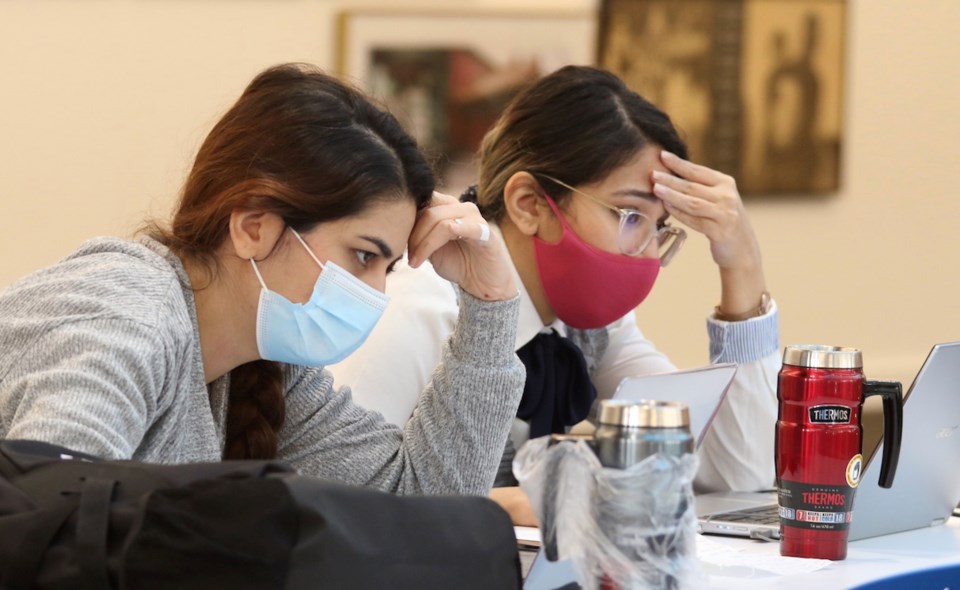B.C. has 893 COVID-19 patients in hospitals – the lowest number in nearly three weeks, and something that provides hope that the Omicron wave of COVID-19 infections is fading.
Of those, 143 are in intensive care units (ICUs), which is three fewer than the months-high total of 146 yesterday.
Another 18 people have died while infected, which is higher than average. Yesterday, however, officials said that no one had died from COVID-19 in B.C. The wide disparity between the two days hints that perhaps all health regions did not report data for deaths yesterday.
Transmissions are still taking place in health-care settings even though workers in hospital acute-care wards, and in seniors' homes, must be vaccinated.
Provincial Health Officer Dr. Bonnie Henry announced a plan in October to require that all health-care workers in the province be vaccinated, but she revealed today that this has not yet been the case.
She said she has been working with health-professional colleges to sort out details, and that the new date by which all of B.C.'s health-care workers must be vaccinated is March 24. This order includes family doctors, dentists, chiropractors and pharmacists among others.
A number of Henry's health orders – such as ones limiting restaurant capacity, and banning wedding receptions – expire next week, and she did not give guidance on which ones will be renewed, and which ones will not. Instead, she said she will provide an update next week.
"What you will hear next week will be the details of how we're going to be moving forward," she said.
Eliminating the B.C. Vaccine Card is not one of the changes that she is considering.
She said the vaccine cards "absolutely" serve a scientific purpose. Not only do they act as an incentive for people to get vaccinated, but they limit exposure between people in higher-risk indoor settings, she said.
Henry then drew an analogy between how big a difference there is between what vaccinated and unvaccinated people face in those settings to the difference between herself and Canadian soccer star Christine Sinclair when it comes to playing that sport.
"It's like saying, 'Christine Sinclair and I both play soccer,'" Henry said. "There's a qualitative difference in one is more likely to score a goal than the other."
The difference, however, between vaccinated people getting COVID-19 and unvaccinated people getting the disease is not nearly as stark in the current Omicron wave as it was during the Delta wave.
People who are not fully vaccinated represent about 18% of B.C.'s total population.
Between Feb. 1 and Feb. 7, people not fully vaccinated accounted for 24.3 per cent of cases, according to new government data. Between Jan. 25 and Feb. 7, those individuals accounted for 31 per cent of hospitalizations.
Regardless, Henry has made it clear that a substantial loosening of restrictions is not going to happen because she prefers what she calls the "dimmer-switch" approach of slowly allowing more interactions.
Counts for newly discovered cases have lost value as an indicator of how widespread COVID-19 is in B.C. because vaccinated people with mild symptoms have been told to not get tested, and to simply self-isolate.
Regardless, health officials detected 1,187 new infections in the past day, reducing the number of known active infections by 2,398, to 21,974.
Henry has recently been stressing that older people, particularly those older than 80 years, are by far more vulnerable for serious illnesses.
That is why the 54 active outbreaks at health-care facilities or seniors' homes are such a concern.
While there has been significant churn in the known facilities with outbreaks, only one new outbreak has been declared in the past day, at Sidney All Care in Sidney. The outbreaks at Louis Brier Home and Hospital in Vancouver, and at Victoria General Hospital have been declared over.
Provincial data show 4,500,635 eligible B.C. residents older than five years have had at least one dose of vaccine, while 4,225,555 are considered fully vaccinated with two doses.
There were 20,555 people given booster, or third, doses of vaccine in the past day, for a total of 2,327,036. That is the lowest number of new booster shots provided since December 22.
The B.C. government last year estimated that the province's total population is 5,147,712. Hence, Glacier Media's calculation is that 87.4 per cent of B.C.'s total population has had at least one dose of vaccine, and 82 per cent of the province's total population has had two doses. Nearly 45.2 per cent have had their booster doses. •



